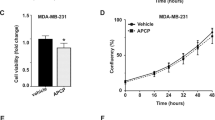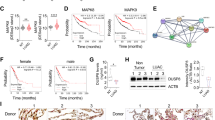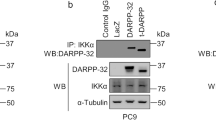Abstract
DUSP1/MKP1 is a dual-specific phosphatase that regulates MAPKs activity, with an increasingly recognized role in tumor biology. To understand more about the involvement of DUSP1 in lung cancer, we performed gene expression analyses of parental and DUSP1-interfered H460 non-small-cell lung cancer (NSCLC) cells. Downregulation of DUSP1 induced changes in the expression levels of genes involved in specific biological pathways, including angiogenesis, MAP kinase phosphatase activity, cell–cell signaling, growth factor and tyrosine-kinase receptor activity. Changes in the expression of some of these genes were due to modulation of c-Jun-N-terminal kinase and/or p38 activity by DUSP1. Complementary functional assays were performed to focus on the implication of DUSP1 in angiogenesis and metastasis. In H460 cells, interference of DUSP1 resulted in a diminished capacity to invade through Matrigel, to grow tumors in nude mice and also to induce metastasis through tail-vein injection. Furthermore, the angiogenic potential of H460 cells was also impaired, correlating with a decrease in VEGFC production and indicating that DUSP1 could be required to induce angiogenesis. Finally, we studied whether a similar relationship occurred in patients. In human NSCLC specimens, DUSP1 was mainly expressed in those tumor cells close to CD31 vascular structures and a statistically significant correlation was found between VEGFC and DUSP1 expression. Overall, these results provide evidence for a role of DUSP1 in angiogenesis, invasion and metastasis in NSCLC.
This is a preview of subscription content, access via your institution
Access options
Subscribe to this journal
Receive 50 print issues and online access
$259.00 per year
only $5.18 per issue
Buy this article
- Purchase on Springer Link
- Instant access to full article PDF
Prices may be subject to local taxes which are calculated during checkout






Similar content being viewed by others
Accession codes
Abbreviations
- BMP2:
-
bone morphogenetic protein 2
- CDDP:
-
Cisplatin
- MERTK:
-
c-mer proto-oncogene tyrosine kinase
- PTPRK:
-
protein tyrosine phosphatase receptor type K
- VEGFC and D:
-
vascular endothelial growth factor C and D
- VEGFR3:
-
vascular endothelial growth factor receptor3
References
Carmeliet P . (2005). Angiogenesis in life, disease and medicine. Nature 438: 932–936.
Chang L, Karin M . (2001). Mammalian MAP kinase signalling cascades. Nature 410: 37–40.
Chattopadhyay S, Machado-Pinilla R, Manguan-Garcia C, Belda-Iniesta C, Moratilla C, Cejas P et al. (2006). MKP1/CL100 controls tumor growth and sensitivity to cisplatin in non-small-cell lung cancer. Oncogene 25: 3335–3345.
Davis RJ . (2000). Signal transduction by the JNK group of MAP kinases. Cell 103: 239–252.
Denkert C, Schmitt WD, Berger S, Reles A, Pest S, Siegert A et al. (2002). Expression of mitogen-activated protein kinase phosphatase-1 (MKP-1) in primary human ovarian carcinoma. Int J Cancer 102: 507–513.
Ding L, Getz G, Wheeler DA, Mardis ER, McLellan MD, Cibulskis K et al. (2008). Somatic mutations affect key pathways in lung adenocarcinoma. Nature 455: 1069–1075.
Downward J . (2008). Targeting RAS and PI3K in lung cancer. Nat Med 14: 1315–1316.
Ekerot M, Stavridis MP, Delavaine L, Mitchell MP, Staples C, Owens DM et al. (2008). Negative-feedback regulation of FGF signalling by DUSP6/MKP-3 is driven by ERK1/2 and mediated by Ets factor binding to a conserved site within the DUSP6/MKP-3 gene promoter. Biochem J 412: 287–298.
Espina C, Cespedes MV, Garcia-Cabezas MA, Gomez del Pulgar MT, Boluda A, Oroz LG et al. (2008). A critical role for Rac1 in tumor progression of human colorectal adenocarcinoma cells. Am J Pathol 172: 156–166.
He Y, Kozaki K, Karpanen T, Koshikawa K, Yla-Herttuala S, Takahashi T et al. (2002). Suppression of tumor lymphangiogenesis and lymph node metastasis by blocking vascular endothelial growth factor receptor 3 signaling. J Natl Cancer Inst 94: 819–825.
He Y, Rajantie I, Pajusola K, Jeltsch M, Holopainen T, Yla-Herttuala S et al. (2005). Vascular endothelial cell growth factor receptor 3-mediated activation of lymphatic endothelium is crucial for tumor cell entry and spread via lymphatic vessels. Cancer Res 65: 4739–4746.
Hynes NE, MacDonald G . (2009). ErbB receptors and signaling pathways in cancer. Curr Opin Cell Biol 21: 177–184.
Johnson GL, Lapadat R . (2002). Mitogen-activated protein kinase pathways mediated by ERK, JNK, and p38 protein kinases. Science 298: 1911–1912.
Kang Y, Siegel PM, Shu W, Drobnjak M, Kakonen SM, Cordon-Cardo C et al. (2003). A multigenic program mediating breast cancer metastasis to bone. Cancer Cell 3: 537–549.
Keyse SM . (2000). Protein phosphatases and the regulation of mitogen-activated protein kinase signalling. Curr Opin Cell Biol. 12: 186–192.
Keyse SM . (2008). Dual-specificity MAP kinase phosphatases (MKPs) and cancer. Cancer Metastasis Rev 27: 253–261.
Langenfeld EM, Calvano SE, Abou-Nukta F, Lowry SF, Amenta P, Langenfeld J . (2003). The mature bone morphogenetic protein-2 is aberrantly expressed in non-small cell lung carcinomas and stimulates tumor growth of A549 cells. Carcinogenesis 24: 1445–1454.
Ling L, Kung HJ . (1995). Mitogenic signals and transforming potential of Nyk, a newly identified neural cell adhesion molecule-related receptor tyrosine kinase. Mol Cell Biol 15: 6582–6592.
Linger RM, Keating AK, Earp HS, Graham DK . (2008). TAM receptor tyrosine kinases: biologic functions, signaling, and potential therapeutic targeting in human cancer. Adv Cancer Res 100: 35–83.
Loda M, Capodieci P, Mishra R, Yao H, Corless C, Grigioni W et al. (1996). Expression of mitogen-activated protein kinase phosphatase-1 in the early phases of human epithelial carcinogenesis. Am J Pathol 149: 1553–1564.
Lu X, Yan CH, Yuan M, Wei Y, Hu G, Kang Y . (2010). In vivo dynamics and distinct functions of hypoxia in primary tumor growth and organotropic metastasis of breast cancer. Cancer Res 70: 3905–3914.
Marinov M, Ziogas A, Pardo OE, Tan LT, Dhillon T, Mauri FA et al. (2009). AKT/mTOR pathway activation and BCL-2 family proteins modulate the sensitivity of human small cell lung cancer cells to RAD001. Clin Cancer Res 15: 1277–1287.
Morrison DJ, Kim MK, Berkofsky-Fessler W, Licht JD . (2008). WT1 induction of mitogen-activated protein kinase phosphatase 3 represents a novel mechanism of growth suppression. Mol Cancer Res 6: 1225–1231.
Nutt JE, Foster PA, Mellon JK, Lunec J . (2007). hEGR1 is induced by EGF, inhibited by gefitinib in bladder cell lines and related to EGF receptor levels in bladder tumours. Br J Cancer 96: 762–768.
Offersen BV, Pfeiffer P, Andreasen P, Overgaard J . (2007). Urokinase plasminogen activator and plasminogen activator inhibitor type-1 in nonsmall-cell lung cancer: relation to prognosis and angiogenesis. Lung Cancer 56: 43–50.
Pearson G, Robinson F, Beers Gibson T, Xu BE, Karandikar M, Berman K et al. (2001). Mitogen-activated protein (MAP) kinase pathways: regulation and physiological functions. Endocr Rev 22: 153–183.
Renyi-Vamos F, Tovari J, Fillinger J, Timar J, Paku S, Kenessey I et al. (2005). Lymphangiogenesis correlates with lymph node metastasis, prognosis, and angiogenic phenotype in human non-small cell lung cancer. Clin Cancer Res 11: 7344–7353.
Rojo F, Gonzalez-Navarrete I, Bragado R, Dalmases A, Menendez S, Cortes-Sempere M et al. (2009). Mitogen-activated protein kinase phosphatase-1 in human breast cancer independently predicts prognosis and is repressed by doxorubicin. Clin Cancer Res 15: 3530–3539.
Sanchez-Perez I, Martinez-Gomariz M, Williams D, Keyse SM, Perona R . (2000). CL100/MKP-1 modulates JNK activation and apoptosis in response to cisplatin Oncogene. Oncogene 19: 5142–5152.
Sato M, Vaughan MB, Girard L, Peyton M, Lee W, Shames DS et al. (2006). Multiple oncogenic changes (K-RAS (V12), p53 knockdown, mutant EGFRs, p16 bypass, telomerase) are not sufficient to confer a full malignant phenotype on human bronchial epithelial cells. Cancer Res 66: 2116–2128.
Sos ML, Koker M, Weir BA, Heynck S, Rabinovsky R, Zander T et al. (2009). PTEN loss contributes to erlotinib resistance in EGFR-mutant lung cancer by activation of Akt and EGFR. Cancer Res 69: 3256–3261.
Ventura JJ, Tenbaum S, Perdiguero E, Huth M, Guerra C, Barbacid M et al. (2007). p38alpha MAP kinase is essential in lung stem and progenitor cell proliferation and differentiation. Nat Genet 39: 750–758.
Wada T, Penninger JM . (2004). Mitogen-activated protein kinases in apoptosis regulation. Oncogene 23: 2838–2849.
Yamabuki T, Takano A, Hayama S, Ishikawa N, Kato T, Miyamoto M et al. (2007). Dikkopf-1 as a novel serologic and prognostic biomarker for lung and esophageal carcinomas. Cancer Res 67: 2517–2525.
Yu B, Yang X, Xu Y, Yao G, Shu H, Lin B et al. (2009). Elevated expression of DKK1 is associated with cytoplasmic/nuclear beta-catenin accumulation and poor prognosis in hepatocellular carcinomas. J Hepatol 50: 948–957.
Zhang SC, Hironaka S, Ohtsu A, Yoshida S, Hasebe T, Fukayama M et al. (2006). Computer-assisted analysis of biopsy specimen microvessels predicts the outcome of esophageal cancers treated with chemoradiotherapy. Clin Cancer Res 12: 1735–1742.
Acknowledgements
Ibanez de Caceres was partially supported by the Fondo de Investigacion Sanitaria (ISCIII) through the ‘Miguel Servet’ program (CP 08/000689); VM-A is a recipient of FIS fellowship. IS-P is in receipt of career development awards from the Ramón y Cajal program funded by the Spanish Ministerio de Educación y Ciencia. We acknowledge Leandro Sastre for helping with cTAP constructs and helpful discussions. We thank Silvia Menéndez (Hospital del Mar-IMAS) and Nuria Pérez-González (Fundación Jiménez Díaz) for the technical support. We also thank Javier Perez and Fernando Núñez (IIB) for the artwork and animal facility, respectively. This work was supported by PI05/2019, PI05/1305, PI06/1513, PI081485, PI09/1296, PS09/01285 and PS09/00472 (Spanish Health Ministry grant ‘Fondo de Investigación Sanitaria’), SAF2007-62292 (Ministerio de Educación y Ciencia grant), SAL-0311-2006 (Comunidad Autónoma de Madrid) and RTICC 06/0020/19 grant. We especially thank Fundació Privada Cellex (Barcelona) and Fundación Médica Mutua Madrileña for a generous grant to the Medical Oncology Service, Hospital del Mar-IMAS and to Instituto de Investigaciones Biomédicas (IIB), respectively.
Author information
Authors and Affiliations
Corresponding author
Ethics declarations
Competing interests
The authors declare no conflict of interest.
Additional information
Supplementary Information accompanies the paper on the Oncogene website
Rights and permissions
About this article
Cite this article
Moncho-Amor, V., Ibañez de Cáceres, I., Bandres, E. et al. DUSP1/MKP1 promotes angiogenesis, invasion and metastasis in non-small-cell lung cancer. Oncogene 30, 668–678 (2011). https://doi.org/10.1038/onc.2010.449
Received:
Revised:
Accepted:
Published:
Issue Date:
DOI: https://doi.org/10.1038/onc.2010.449
Keywords
This article is cited by
-
DUSP1 Promotes Osimertinib Drug-Tolerant Persistence by Inhibiting MAPK/ERK Signaling in Non-small Cell Lung Cancer
Molecular Biotechnology (2024)
-
Two microRNAs of plasma-derived small extracellular vesicles as biomarkers for metastatic non-small cell lung cancer
BMC Pulmonary Medicine (2023)
-
Dual-specificity phosphatases: therapeutic targets in cancer therapy resistance
Journal of Cancer Research and Clinical Oncology (2022)
-
Transcriptome analysis of potential candidate genes and molecular pathways in colitis-associated colorectal cancer of Mkp-1-deficient mice
BMC Cancer (2021)
-
A deficiency in SUMOylation activity disrupts multiple pathways leading to neural tube and heart defects in Xenopus embryos
BMC Genomics (2019)



